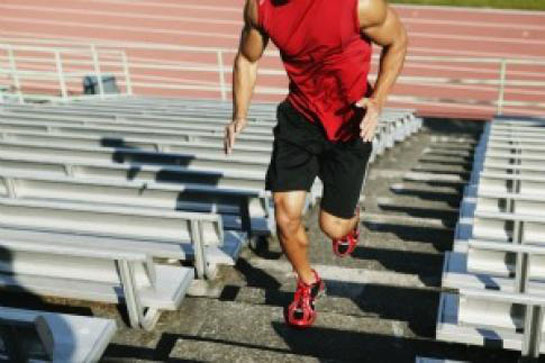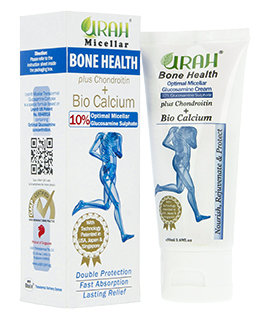
Attempting the Swissotel Vertical Marathon throws up a different set of challenges compared to your conventional 42km marathon race. Scaling 72 storeys up Southeast Asia's tallest hotel is no easy feat especially when you're battling gravity, fatigue, cramped and stuffy stairways as well as protruding objects. You'll need a specialised training approach to condition your body.
Dr. Roger Tian, Consultant Sports Physician and Deputy Medical Director, Singapore Sports Medicine Centre, cautions, "Running against gravity greatly increases the stress on both the cardiovascular (heart and lungs) and musculoskeletal (bones, joints, muscles) systems. Environmental conditions within the stairwell such as humidity and ventilation will also increase the effort required as well as the load on the heart and lungs."
Suzy Walsham, winner of the Women's Open category for five years in a row from 2006 to 2010, can testify. "It is definitely not easy! Be prepared for some intense pain and go in with a strong mind as you will need it, " says the Sydney-born Singapore Permanent Resident. "You need to try to relax and stay focused so you can keep on climbing those stairs as fast as possible," she adds, "It can also be technically challenging as each staircase is different, for example, the side the handrail is on; the direction you go up the stairs; whether there are landing areas between the stairs, etc. And there is not always a lot of room so passing other competitors can also be challenging."
Suzy (pictured right, in black) won the 2010 Swissotel Vertical Marathon Women's Open category in 9min 13sec. This was just three months after giving birth! Her personal best for the vertical marathon is 8min 19sec, which she had set in 2008. The victory got her, and the Men's Open winner, a ticket to the prestigious Empire State Building Run-Up 2011, a by-invitation-only competition.
The accountant trains all year round, competing in 10km road races as well to maintain her fitness level at peak condition. Suzy ramps up her training 4 - 6 weeks before a vertical marathon, incorporating stair sessions up the 30 floors of her condominium. She progresses from one to two stair sessions per week on top of the 70km she runs weekly. Suzy even squeezes in some speedwork on the stairs - covering 10 floors, resting for 30 seconds and going for another 10, repeating this circuit for about 4 - 5 times.
To aid those attempting their first Swissotel Vertical Marathon, we asked the 37-year-old to help design a basic training program.
Your 4-Week Vertical Marathon Training Plan
Your workout should incorporate practice on stairs, says Suzy. It could be your HDB block, your office building or even the longest and steepest hill you can find. "The power to get up the stairs comes from your quads and glutes, and to a certain extent, the calf muscles as you push off," she points out. "You could do some leg squats and lunges to help build strength in these areas, as well as some step-ups." Dr. Tian advises, "Stretch and massage the calves and Achilles daily. Strengthen them with heel raises once or twice a week. These muscles will work hard when going up the stairs."
Upper-body strength should not be neglected. As Suzy explains, "I also use the handrails to help pull myself up, so some push-ups and other arm weights could also help if you plan to use the handrails." Another area you should focus on is your core. "Strong core muscles not only keeps the trunk and pelvis stable, thus reducing excessive load on the knees, but will reduce the effort of climbing," adds Dr. Tian.
Bearing in mind all these factors, Suzy has drawn up a 4-week training plan to help condition your body to meet the rigorous demands of the Swissotel Vertical Marathon. "The aim of the training is to help build your body's tolerance to lactic acid and build a little strength and endurance," she explains, "It will also prepare you mentally for the race as you will have at least some experience of what you will feel. You can also practice whether you want to try running two stairs at a time or just one, and how much you want to use the handrail."
| WEEK 1 |
3 days of 30min cardio and ab work (for core strength) |
1 x Stair session - Start by doing 5 sets of 8-10 floors. if it is a tall building, you could have a minute or two rest in between each rep, otherwise catch the lift back down. Don't try to do this first session too hard - pace yourself and aim to complete the session. |
|
2 x Weight sessions including leg squats (3 sets of 10), lunges (3 sets of 10), pushups and other arm weights. The weight sessions could be done after the 30min cardio or on a separate day with a 10-15min warm up. |
||
| WEEK 2 |
2 days of 30min cardio and ab work |
2 x Stair sessions - 1 the same as the previous week (see if you can improve!) and the other could be a bit longer if you are in a tall building (ie do 5 sets of 15 floors), otherwise do 6 sets of 10 floors. |
|
2 x Weight sessions including leg squats (3 sets of 10), lunges (3 sets of 10), pushups and other arm weights. The weight sessions could be done after the 30min cardio or on a separate day with a 10-15min warm up. |
||
| WEEK 3 |
2 days of 30min cardio and ab work |
2 x Stair sessions - 1 shorter, faster one such as 10 sets of 5 floors with 30seconds to 1min recovery (or lift back down) and one longer session of 5 sets of 15 floors (catching the lift back down). |
|
2 x Weight sessions including leg squats (3 sets of 10), lunges (3 sets of 10), pushups and other arm weights. The weight sessions could be done after the 30min cardio or on a separate day with a 10-15min warm up. |
||
| WEEK 4 |
2 days of 30min cardio and ab work |
1 X Stair session (preferably at least 5 days before race day) of 5 sets of 10 floors with either 1min recovery if it's a tall building or catching the lift back down. Drop the weight sessions in the final week and ease up for the few days before the event -- you want to go into the race feeling fresh and not tired. |
72 Storeys Are A Huge Strain On Your Knees
Huffing and puffing up 72 storeys to the helipad of Swissotel the Stamford is going to wear you out, make no mistake about it. That's why both Dr. Tian and the organisers recommend participants to get their doctor's clearance before taking part. "Running increases the load on the knees 2 - 5 times and stair-climbing stresses your knee by another 3 - 4 times more than normal. Add the two together and you increase the risk of knee injuries, such as to the meniscus and cartilage, as well as calf strains, particularly calf muscles and Achilles tendon which are used when climbing stairs," says Dr. Tian. There's also the added strain on your heart, which increases the risk of a heart attack in those with underlying heart conditions or hypertension, he adds.
Additionally, you could start seeing stars and black out during the course of the vertical marathon. Dr. Tian explains, "You may suffer from disorientation and giddiness from repetitively running in the same direction and the lack of visual stimuli can lead to falls and injuries."
Race Day Strategy
To avoid getting dizzy on your way up, Dr. Tian suggests a simple trick - avoid focusing on a fixed point like your feet or the few steps at eye level. "Instead, look up and down the flight of stairs as you ascend. This provides stimuli for the balance and coordination centres in the brain," the Singapore Sports Medicine Centre Deputy Medical Director explains." And remember to wear comfortable shoes that provide good cushioning and ankle stability.
The night before, make sure you clock at least 8 hours of sleep, recommends Dr. Tian, along with a carbohydrate-rich supper to top up your muscle glycogen stores. On the day itself, opt for a light breakfast (mainly carbs, low fat, low protein) two hours before the event. Make sure you also consume enough fluids (water or sports drink) an hour or two before kick-off (avoid coffee, tea, carbonated sodas or high-fat drinks like Milo). No food or drinks are allowed along the staircase so you should power up prior to the flag-off!
Suzy suggests you go slow if you're a beginner."I strongly recommend that you start at a very easy pace - you will be surprised at how quickly you will get tired and how tough it becomes. It is very easy to go too fast at the beginning and then really struggle. 72 floors is a long way and the aim is to reach the top," the veteran vertical marathoner advises. But she also adds, "You will be rewarded with a great sense of achievement...and an amazing view."
Source: http://www.menshealth.com.sg/fitness/train-vertical-marathon
Click here to Check How to Use Urah Products
Click here to Check the Quality of your Glucosamine Product before use

2026 © URAH Transdermal Pte Ltd. ALL Rights Reserved. Urah Privacy Policy | Terms of Service | Return Policy
Disclaimer: All contents on this website are provided for general information only, and should not be treated as a substitute for the medical advice of your Physician or any other health care professional. Urah is not responsible or liable for any diagnosis made by any user based on the content of this website. Always consult your own Physician if you're in any way concerned about your health. Urah Micellar Transdermal Cream formulae are not patented or under any patent rights.
No comment yet